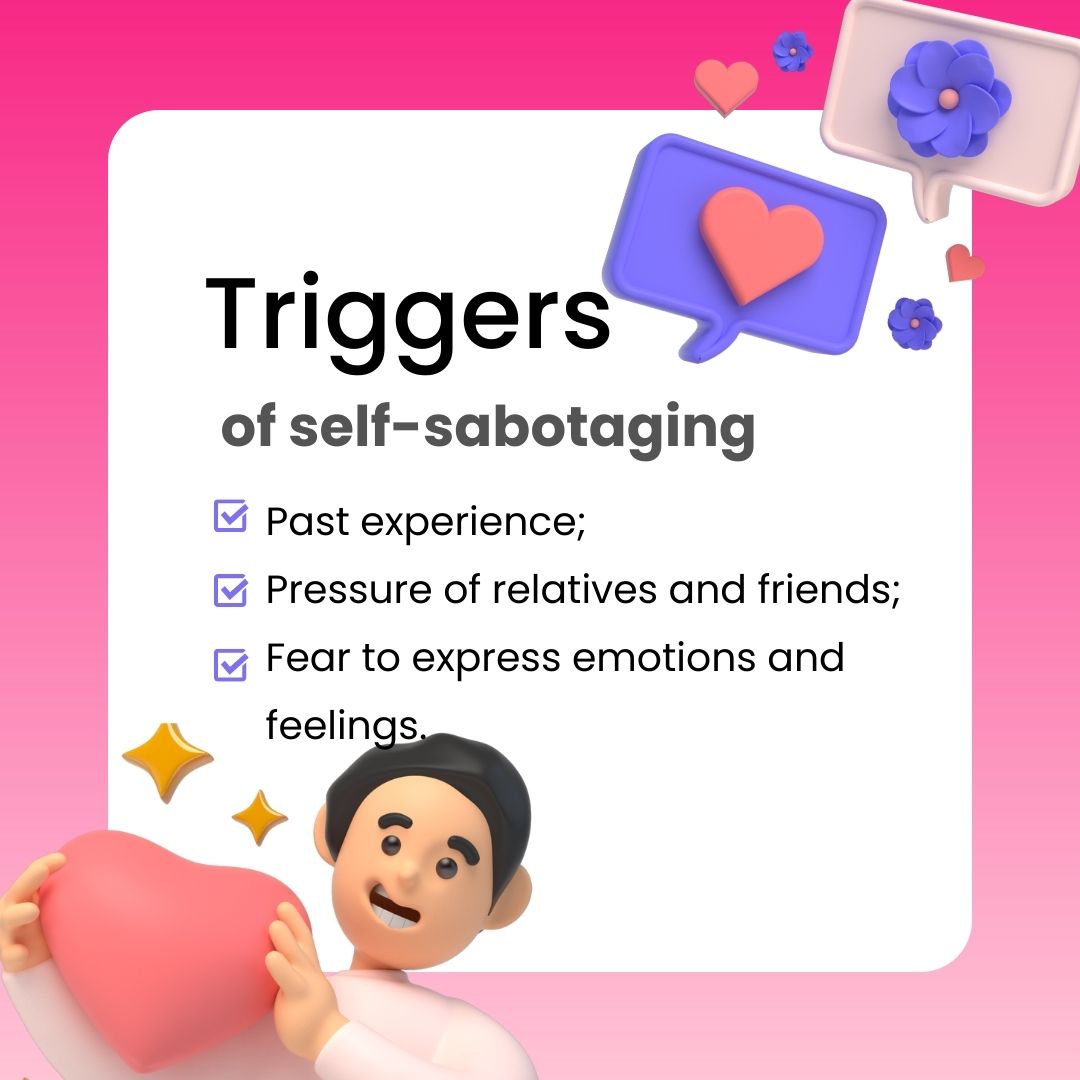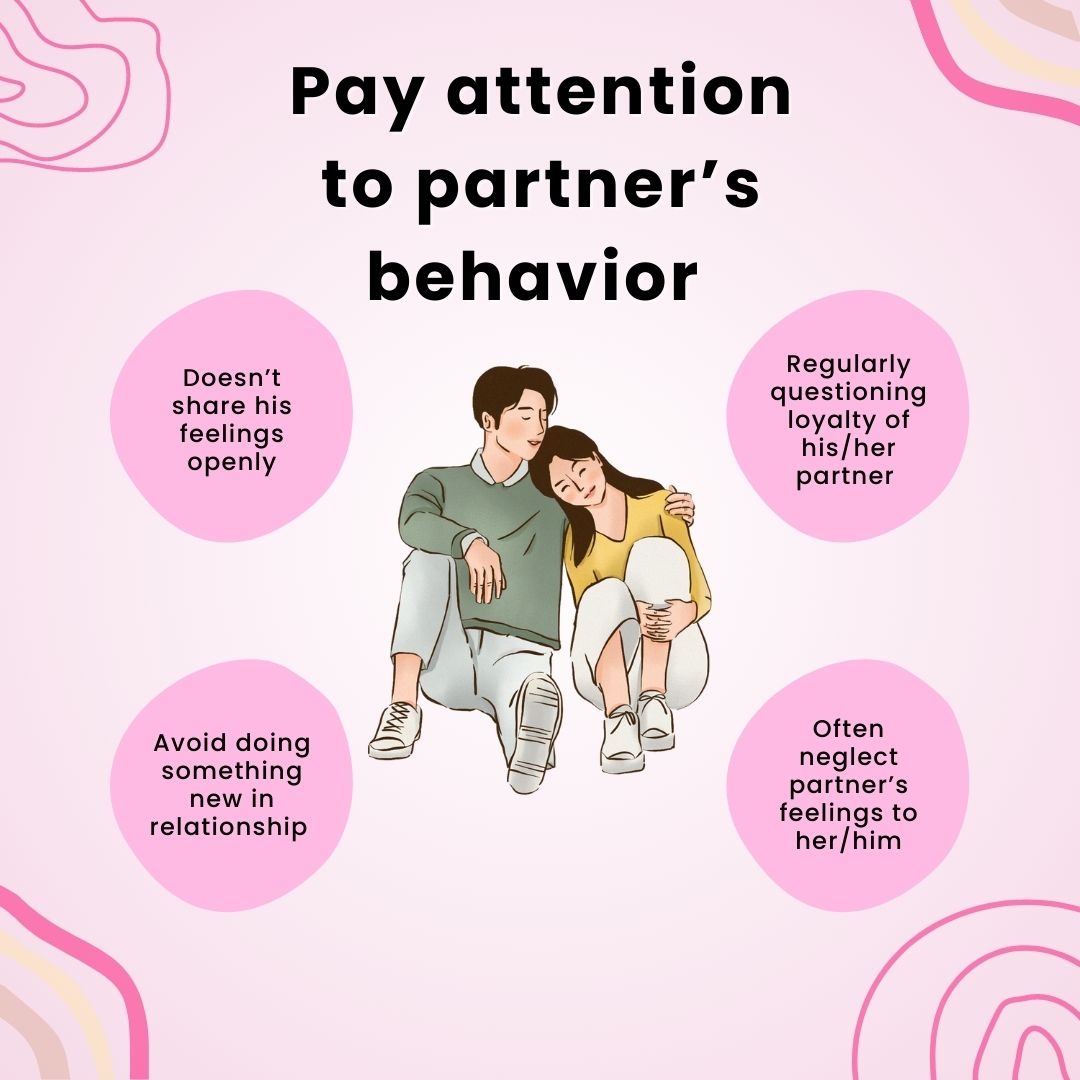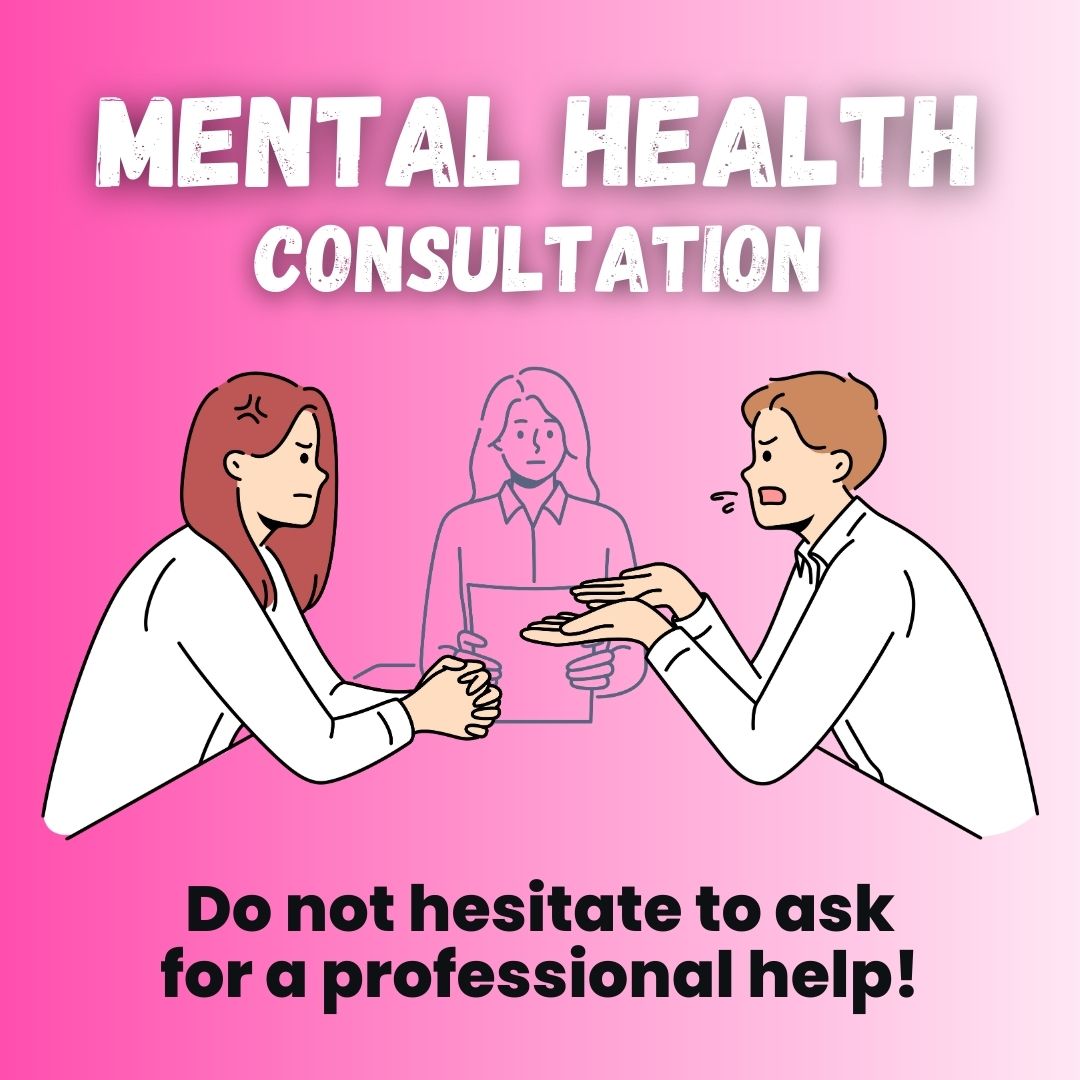
Have you ever noticed self-sabotaging behaviors in relationships with your partner? Most self sabotaging relationships quotes claim that both men and women can be engaged in self-destructive actions without realizing it actually happens. Can you believe that people prepare themselves for romantic failure and rush up this process on their own? The real factors that lead to developing harmful relationship patterns are deeper than self-defense. I’m going to go over this topic in great detail to help you understand why you’re doing it and how to stop self-sabotaging relationships.
🧐 Discovering Self-Sabotaging Meaning in Relationships
To explain what is self-sabotaging relationships, specialists usually refer to a psychological and social phenomenon that has evolved over time as a result of studies and debates in the disciplines of psychology, therapy, and self-help literature. It is commonly recognized as the combined thoughts of experts and specialists in these fields of study.
In partnerships, self-sabotage refers to patterns of behavior or acts committed by a person that weaken or destroy the relationship’s achievement and well-being. Many self-sabotaging relationships quotes explain that these actions are frequently motivated by subconscious ideas, worries, or unsolved emotional difficulties, which cause people to act in ways that restrict the partnership’s growth and satisfaction. You may frequently run into the self sabotaging relationships meme but don’t actually realize it reflects this issue. It definitely happens to your relationships, when you don’t exactly know what does self sabotaging relationships mean, it’s difficult to notice their signs.

☝️How self-sabotaging relationships influence a person
Relationships with self-sabotaging issues greatly affect individuals’ well-being. Here are a few insights into what causes self-sabotaging behavior in relationships:
- Mental health impact. Self sabotaging behaviors in relationships can lead to psychological issues such as anxiety, depression, and a lack of self-worth.
- Physical health. Long-term stress from self-destructive relations may result in physical health issues such as cardiovascular disease, weaker immune systems, and altered sleep habits over time.
- Cycle of negative patterns. Individuals who participate in self-destructive relationships may become trapped in a loop of bad tendencies that damage their general state of life.
- Quality of life. These partnerships may block growth as individuals, limit prospects for enjoyment, and cause disruption in emotions.
- Impact on self-worth. Due to prolonged emotional suffering, people in self-sabotaging relationships may feel a decrease in self-worth and experience low self-esteem sabotaging relationships.
- Challenges in communication. Communication breakdowns and misunderstandings are common in self-sabotaging relationships, leading to frustration and resentment.
- Impact on other relationships. Friends, relatives, and other close people to the person may also be affected by his self-sabotaging relationships.

Reasons for Self-Sabotaging Behavior In Relationships
Such actions may take place for a variety of reasons, many of which are related to a person’s past experiences, principles, and behavioral tendencies. Look through some common cases that foster relationship self-sabotage:
📌 Fear of vulnerability. Opening up emotionally and being vulnerable in a relationship can be intimidating for some people. Fear of getting hurt or rejected may lead them to avoid intimacy or push their partner away.
📌 Low self-esteem. People with low self-esteem may struggle to accept that they can be loved and be happy. They may self-sabotage with the help of the conflict or engage in self-destructive behavior to fill themselves with negative self-beliefs.
📌 Fear of abandonment. Past experiences of abandonment or attachment issues can lead to a fear of being left or rejected by a partner. This fear may cause people to push their partners away before they can be abandoned.
📌 Unresolved trauma. Past traumas, such as previous abusive relationships or childhood experiences, can influence relationship dynamics. Unresolved trauma may lead to emotional triggers and defensive behaviors that disrupt the relationship.
📌 Negative relationship patterns. If an individual has experienced unhealthy relationships in the past, they may unconsciously replicate those patterns in their current relationship, perpetuating a cycle of dysfunction.
📌 Commitment issues. Fear of commitment can lead individuals to self-sabotage relationships when things start to get serious. They may distance themselves or find reasons to end the relationship to avoid the responsibilities of commitment.
📌 Unrealistic expectations. Having unrealistic expectations of a partner or the relationship can lead to dissatisfaction and disappointment. The individual may sabotage the relationship if it doesn’t meet their idealized expectations.
📌 Coping mechanisms. Some may use self-sabotage as a way to deal with stress or anxiety. Another chance to be overwhelmed with destructive behavior may provide temporary relief but can have damaging long-term effects on the relationship.
What else can trigger self-sabotaging?
📌 Lack of communication skills. Difficulty expressing needs, emotions, or concerns can lead to misunderstandings and unresolved issues within the relationship, leading to self-sabotaging behaviors.
📌 External influences. It’s too often when our behavior and actions are influenced by opinions of our family, friends, or societal norms. If the relationship does not align with their expectations, people may sabotage it to conform to those expectations.
It is important to recognize that self-sabotaging behavior in relationships is complex and often unconscious.

🕵🏻Signs of Self-Sabotaging in Relationships
People reflect self-sabotaging behavior in relationships through various actions and attitudes that affect the normal processes of the partnership. The signs of self sabotaging relationships are often subconscious and driven by underlying fears, insecurities, or unresolved emotional issues. 👉 I’ve collected some common signs of self-sabotaging relationships:
🔎 A person resists emotional intimacy and vulnerability, keeping their partner at a distance and not fully opening up about own feelings or fears.
🔎 Self sabotaging relationships signs include unconscious creating unnecessary drama or conflicts in the relationship, leading to unnecessary tension and stress.
🔎 Doubting the stability and future of the relationship, questioning their partner’s love and commitment.
🔎 They may test their partner’s trust by engaging in suspicious behavior or seeking reassurance excessively.
🔎 Self-sabotagers may excessively analyze and overthink every aspect of the relationship, leading to feelings of anxiety and doubt.
🔎 They may put themselves down, or criticize themselves excessively, leading to a negative self-image that can affect the relationship.
🔎 They avoid taking the relationship to the next level.
🔎 They may prioritize the needs of others over their own in the relationship, neglecting their own well-being and desires.
🔎 Comparing current partners to past relationships or idealized versions of previous partners.
🔎 Engaging in self-destructive behaviors, such as substance abuse or reckless actions.
🔎 They don’t talk about their needs, fears, or concerns effectively, which is common for self-sabotaging relationships signs.
🔎 Self-sabotagers have difficulty accepting love and affection from their partner.
🔎 Excessive control over the relationship or their partner, trying to manage outcomes and avoid potential disappointment.
These reflections of self sabotaging behavior in relationships can hinder the growth and happiness of the relationship, leading to challenges and difficulties for both partners. Recognizing these self-sabotaging relationships examples in time can help you break free from self-sabotaging tendencies and foster healthier and more fulfilling relationships.

❓How to Stop Self Sabotaging Relationships Effectively 🆘
Self-sabotaging actions in relationships involve self-awareness, self-compassion, and a dedication to personal progress. You must recognize and accept that you or your partner have a negative effect on your relationships. If you’re looking how to stop self sabotaging in relationships, I recommend the following.
💁 Self-reflection
Take time to reflect on your thoughts, feelings, and behaviors in the relationship. Identify patterns of self-sabotage and try to understand the underlying fears or insecurities driving these actions.
😡 Identify triggers
Recognize the circumstances or triggers that cause self-sabotage. Consider whether your triggers are influenced by past experiences or traumas. Being aware of these triggers can assist you in anticipating and managing self-destructive impulses. Use mindfulness and meditation practices to become more present and aware of your thoughts and emotions in real-time. This might assist you in identifying triggers as they occur.

🗣️Communication
Practice open and honest communication with your partner. Share your fears and concerns, and be willing to listen to their perspective. Effective communication can build trust and strengthen relationships. Avoid being defensive or withholding information. Frame your concerns using “I” statements to express your emotions and perspective without blaming.
🙆 Practice self-compassion
Be kind and understanding toward yourself. Recognize that self-destructive behavior is frequently founded on previous experiences and coping techniques. Treat yourself with the same care that you would show a friend facing the same challenges. It’s about accepting your own humanity as a whole, accepting your weaknesses, and being kind to yourself in difficult situations. Remember that you are not alone in your struggle. When you catch yourself being self-critical, challenge those thoughts. Avoid setting overly high standards that lead to self-criticism.
🧑🏫 Seek professional help
In order to stop self sabotaging relationships, think about getting the advice of a therapist, who can assist you in exploring the roots of the problems that contribute to self-sabotage and providing advice on how to deal with these patterns. Couples therapy can help both partners interact more effectively and address relationship dynamics if self-sabotaging tendencies are impacting your love connections. If your self-destructive habits are linked to mental health illnesses such as depression self-sabotaging relationships, anxiety, or personality disorders, a psychiatrist can help manage your medication and give therapy assistance. Joining relationship support groups can give you a sense of community, affirmation, and chances to learn from others who have had similar struggles.

🙅🏻♂️ Set healthy boundaries
Establish clear and healthy boundaries in the relationship. Understand your needs and communicate them assertively, while respecting your partner’s boundaries as well. Frame your boundaries in a positive and constructive way.
Instead of saying, “I don’t want you to do this,” say, “I would appreciate it if you could…” Clearly let your partner know about the consequences if your boundaries are crossed. Be prepared to follow through with these consequences if necessary.
🤯 Challenge negative thoughts
Challenge negative thought patterns and self-critical beliefs. Replace them with positive affirmations and realistic self-appraisal. Ask yourself: “What evidence do I have to support this negative thought?” Often, negative thoughts are based on assumptions or distorted perceptions. Look for concrete evidence that either supports or contradicts the thought.
🧘🏻 Practice mindfulness
Mindfulness techniques can help you become more in the moment and aware of your thoughts and emotions. Mindfulness will let you break free from self-sabotaging habits. Make mindfulness a daily habit. Even a few minutes every day can make a difference. Duration is less significant than regularity.

😢 Embrace vulnerability
Accept vulnerability as a necessary part of the connection in a relationship. Allow yourself to be open and honest with your partner about your feelings and fears. Recognize that vulnerability is not a sign of weakness and that there is nothing to be ashamed of. Use “I” statements to express your emotions and thoughts. For example, say, “I feel anxious about this…” rather than blaming or making assumptions. Understand that feeling fear or discomfort is okay when being vulnerable. Accept these feelings but don’t let them hold you back.
🧑🎓 Focus on personal growth
Pay more attention to personal growth and self-improvement. Participate in activities that boost self-esteem, confidence, and emotional resilience. Step outside of your comfort zone and let yourself face new challenges. When you accept new challenges and break barriers, you are the next step to success. Spend some time considering your abilities, mistakes, values, and goals. Self-awareness is the basis for personal growth.
📝 Develop coping strategies
Build healthy methods to overcome stress, anxiety and self-sabotaging relationships as well. Engage in activities that provide relaxation, such as exercise, meditation, or creative pursuits. Find humor in situations when it’s appropriate for you. There’s no certain advice since every person should search for their own mechanisms that work for them the best.
🥇 Celebrate successes
Acknowledge and celebrate moments of progress and success in overcoming self sabotaging behavior relationships. Celebrating these achievements can reinforce positive changes and encourage further growth. Step by step, it’s possible to challenge any serious issue.

Conclusion
Self sabotaging meaning in relationships shouldn’t be overestimated. Remember that resolving self-sabotage requires patience and dedication. Be kind to yourself and open to receiving help from loved ones and specialists. You can develop a healthier and more rewarding connection with yourself and your partner by taking preventive steps to solve this issue. There are few songs about self sabotaging relationships but you definitely heard “Stay” by Rihanna. This song explores the ambivalence of wanting to break free from a toxic relationship while simultaneously feeling drawn to it. No matter how many quotes about self sabotaging relationships you may read or hear, they will only help if you strongly realize you or your partner have this problem to solve.
FAQ:
- Am I just self-sabotaging my relationship?
- If you consistently engage in behaviors that harm your relationship, such as pushing your partner away or avoiding intimacy, you might be self-sabotaging.
- How to love someone who self sabotages?
- Show patience and support, encourage open communication, and help them seek professional help if needed. Understand that their struggles are not a reflection of your worth.
- Why do I keep self-sabotaging relationships?
- Self-sabotage can stem from various factors, such as past experiences, insecurities, or fear of vulnerability. Identifying these root causes and seeking therapy can help break the cycle.

Chris Newman is a renowned dating expert and passionate writer. Through his writing, Chris aims to empower readers with the knowledge and tools necessary to build meaningful connections, enhance self-confidence, and overcome obstacles in their romantic journeys.
His articles and blog posts cover a wide range of topics, including dating tips, relationship advice, self-improvement, and personal growth. Chris is known for his ability to break down complex concepts into practical, actionable steps, making his guidance accessible to readers of all backgrounds.
